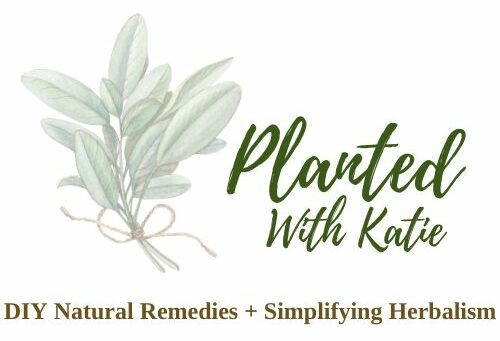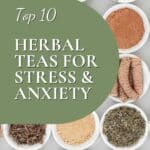10 Best Herbal Teas For Stress and Anxiety Relief
In the rush of our daily lives, taking time to unwind and destress is crucial for our well-being. Herbal teas for stress and anxiety offer a natural and effective remedy. These tea blends we'll discuss, crafted from a variety of calming herbs, provide a holistic approach to relaxation.
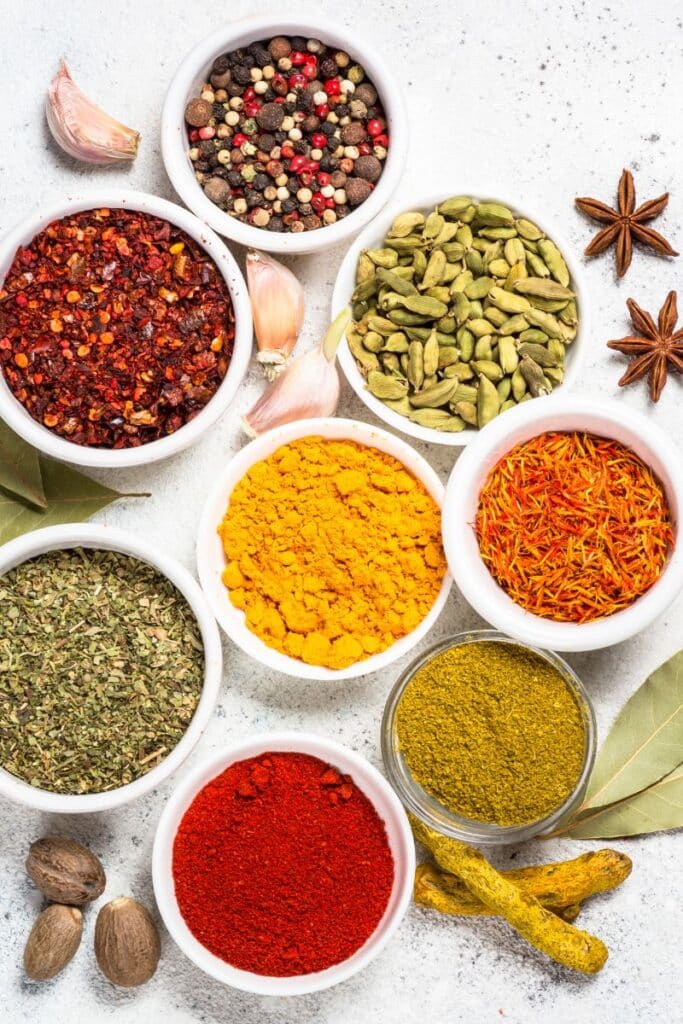
Disclaimer: Information and statements shown here are for educational and informational purposes only and are not to replace the advice of your healthcare professional.
This post may include affiliate links. Please refer to our disclaimer for full disclosure.
Experts say that stress-related issues are some of the main reasons people face challenges with their mental health globally. The world is changing quickly, and uncertainties in personal and work life, along with technology, contribute to higher stress levels. Big events like the COVID-19 pandemic have made stress and anxiety even more widespread.
It's important to talk about and deal with stress and anxiety. They not only affect individuals but also impact the world's overall health, productivity, and how people live their lives.
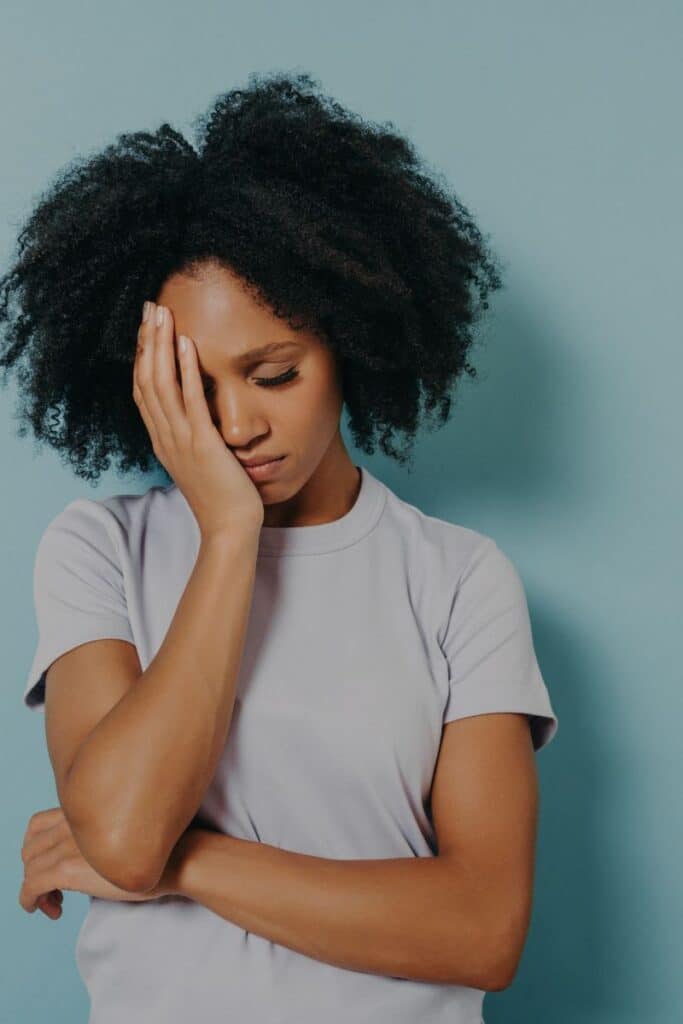
Herbal medicine can have great benefits to the stress chemicals in our bodies. Herbs come in and ask, "How can I help?" while most over-the-counter medicine or even prescription medications have one distinct job to do and carry it out whether your body needs it or not.
Whole plants work synergistically with the body and do not have a lot of side effects, but it is important to always speak with a qualified healthcare professional to bring concerns to and make sure herbal medicine is right for you.
Top 10 Benefits of Using Herbs for Stress and Anxiety
Using herbs to lower stress and anxiety offers a natural remedy and holistic approach with various benefits:
- Calming Properties: Many herbs, such as Chamomile, Lavender, and Lemon Balm, possess natural calming properties that help soothe the nervous system. They can promote a sense of tranquility and relaxation.
- Adaptogenic Support: Adaptogenic herbs like Ashwagandha and Rhodiola help the body adapt to stressors, modulating the release of stress hormones. This adaptability can contribute to better stress management.
- Nervine Effects: Nervine herbs, including Passionflower and Skullcap, act on the nervous system, reducing tension and promoting a calm state of mind. They are particularly beneficial for individuals dealing with anxiety and nervousness.
- Improved Sleep Quality: Herbs like Valerian and Chamomile have mild sedative effects, aiding in improving sleep quality. Quality sleep is crucial for overall well-being and stress reduction.
- Mood Enhancement: Certain herbs, such as St. John's Wort, have mood-lifting properties. They can positively influence neurotransmitters like serotonin and dopamine, contributing to improved mood and emotional balance.
- Anti-Inflammatory Effects: Chronic stress often leads to inflammation in the body. Herbs like Turmeric and Ginkgo Biloba, with anti-inflammatory properties, may help reduce inflammation, potentially alleviating some stress-related symptoms.
- Antioxidant Support: Some herbs are rich in antioxidants, such as Green Tea and Ginkgo Biloba. Antioxidants help combat oxidative stress, which is associated with various health issues, including stress.
- Balancing Hormones: Adaptogenic herbs, in particular, may help balance hormonal levels, including cortisol, the primary stress hormone. Maintaining hormonal balance contributes to a more stable mood and reduced stress.
- Holistic Approach: Herbal remedies encourage a holistic approach to health, addressing not only the symptoms but also the underlying causes of stress and anxiety. This holistic perspective supports overall well-being.
- Customizable Blends: Individuals can create personalized herbal blends based on their preferences and specific needs. This flexibility allows for a tailored approach to stress management.

It's essential to note that while herbs can be beneficial, they are not a substitute for professional medical advice. Individuals experiencing severe or chronic stress and anxiety disorder should consult healthcare professionals for comprehensive guidance and support.
12 Herbs to Relieve Stress and Anxiety
Let's dive into some herbs that have been traditionally used to support the body's response to stress and anxiety. Here's a short list of the best teas to drink when needing to lower stress and anxiety:
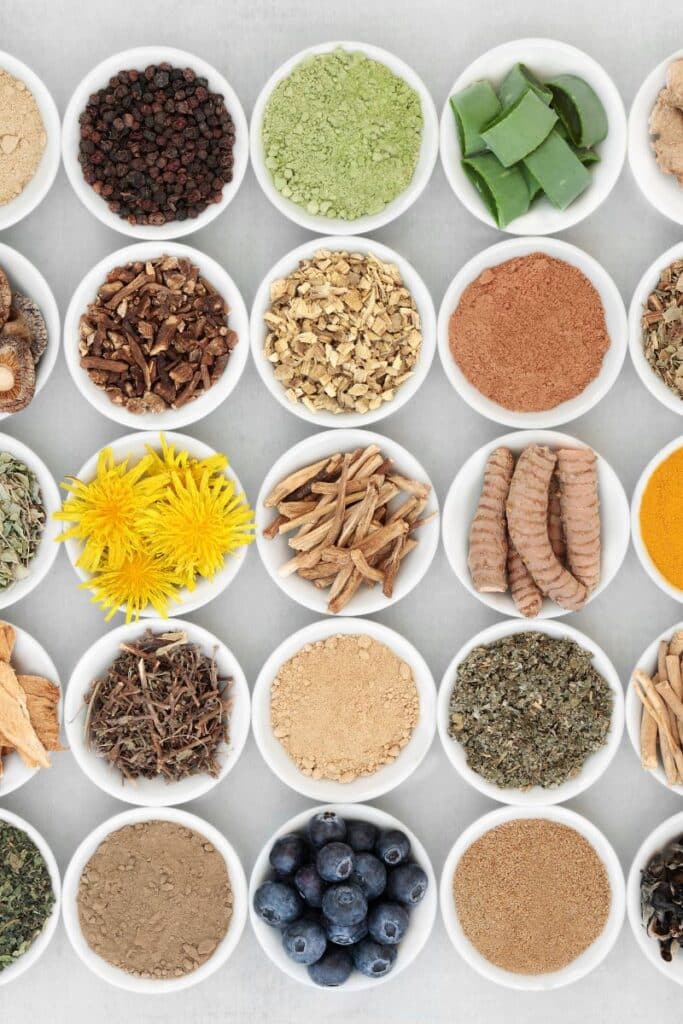
- Passionflower (Passiflora incarnata): This herb is known for its calming and sedative properties. It's often used to help reduce feelings of anxiety and promote a sense of calm. Passionflower tea works by increasing the levels of gamma-aminobutyric acid (GABA) in the brain, which helps to reduce the activity of some brain cells, inducing a greater state of relaxation.
- Studies suggest that passionflower may have anxiolytic effects, possibly through its interaction with GABA receptors in the brain. (Akhondzadeh, Naghavi, Vazirian, Shayeganpour, Rashidi, & Khani, 2001)
- Lemon Balm (Melissa officinalis): Lemon balm is a gentle nervine that can help to soothe the nervous system, making it useful for stress and symptoms of anxiety. It's also known for its mood-lifting properties.
- Ashwagandha (Withania somnifera): This adaptogenic herb helps the body adapt to stress by modulating the release of stress hormones from the adrenal glands. It's often used for a calming effect, to reduce anxiety and improve sleep.
- Ashwagandha is an adaptogenic herb that may help the body cope with stress. Studies suggest its potential in reducing stress and anxiety symptoms. (Chandrasekhar, K., Kapoor, J., & Anishetty, S. 2012).
- Chamomile (Matricaria recutita): Chamomile is a gentle herb known as a calming tea with many soothing properties. Chamomile flowers are often used to help reduce anxiety, lower the stress response, and promote sleep.
- Holy Basil (Ocimum sanctum): Also known as Tulsi, this adaptogenic herb helps to balance different processes in the body, and is used to reduce anxiety and stress. This a popular herb in ayurvedic medicine.
- Rhodiola (Rhodiola rosea): This herb is known for its ability to help the body adapt to stress. It's often used to reduce mental fatigue and improve concentration.
- Rhodiola has adaptogenic properties and may help the body adapt to stress. Some studies suggest its potential in reducing symptoms of stress and fatigue. (Ishaque, S., Shamseer, L., Bukutu, C., & Vohra, S., 2012).
- Skullcap (Scutellaria lateriflora): Skullcap is a powerful nervine, meaning it helps to calm the nerves. It's often used for anxiety, especially when muscle tension is involved.
- Valerian (Valeriana officinalis): Valerian is a potent herb that can help to promote relaxation and sleep. It's often used for anxiety and insomnia. It acts as a natural sleep aid by supporting the body's melatonin levels.
- Valerian has been studied for its potential calming effects and sleep-inducing properties. It may influence GABA levels receptors in a manner similar to some conventional anxiety medications. (Bent, S., Padula, A., Moore, D., Patterson, M., & Mehling, W., 2006). - St. John's Wort (Hypericum perforatum): While best known for its use in depression, St. John's Wort can also be helpful for anxiety. It's thought to work by increasing the availability of the neurotransmitters serotonin, dopamine, and norepinephrine, which help regulate mood.
- Kava Kava (Piper methysticum): Kava Kava is a Pacific Island herb known for its ability to promote relaxation without causing drowsiness. It's often used for anxiety and stress. A recent study suggests that kava may have anxiolytic (anxiety-reducing) effects. Kava's active compounds, kavalactones, interact with neurotransmitter systems, promoting relaxation. (Sarris, J., Stough, C., Teschke, R., Wahid, Z. T., & Bousman, C. A., 2013).
- Lavender (Lavandula angustifolia): Lavender tea is a gentle, soothing herb often used for relaxation. It can be used in a variety of forms, including teas, tinctures, and essential oils.
- Aromatherapy with lavender essential oil has shown potential anxiolytic effects in scientific research. The inhalation of lavender scent may positively influence mood and reduce anxiety. So just smelling lavender herbal tea will have positive effects. (Koulivand, P. H., Khaleghi Ghadiri, M., & Gorji, A., 2013). - Ginkgo Biloba: While Ginkgo is often used for memory and cognitive function, it can also help reduce anxiety and improve mood by promoting blood flow to the brain.
10 Herbal Teas for Stress and Anxiety
Discovering the most effective herbal teas to alleviate stress and anxiety often requires experimentation. What brings relief to me might not have the same effect for you.
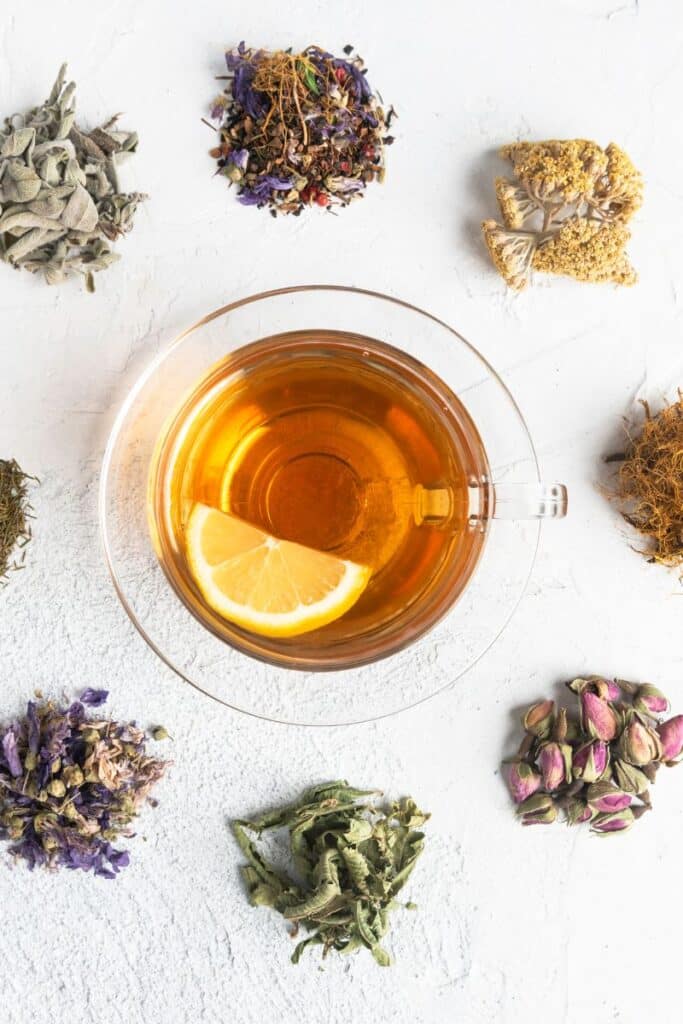
While I've curated my top 10 favorite herbal tea blends for stress and anxiety, the real test is in trying each one and observing how these herbs resonate with your individual needs.
Passionflower and Lemon Balm Tea: Serene Citrus Fusion
- Who it benefits: Ideal for those experiencing mild anxiety, restlessness, or seeking a calming ritual before bedtime. Suitable for individuals looking for a gentle mood lift without sedation as well as a good night's sleep.
- Recipe: Mix 1 part passionflower with 2 parts lemon balm
- Infusion: Steep the blend in hot water for 10 minutes
- Contraindications: Avoid excessive consumption if you're pregnant or nursing. Check for potential interactions with medications.
Ashwagandha and Holy Basil Tea: Adaptogenic Harmony
- Who it benefits: Well-suited for individuals dealing with chronic stress, adrenal fatigue, or seeking an adaptogenic blend to promote overall resilience. May benefit those looking for long-term stress management.
- Recipe: Combine equal parts ashwagandha and holy basil
- Infusion: Steep the blend for 10 minutes for a stress-relieving elixir
- Contraindications: Consult a healthcare professional if you have thyroid disorders or are on medications affecting blood sugar levels.
Chamomile and Valerian Tea: Dreamy Bedtime Bliss
- Who it benefits: Perfect for individuals struggling with sleep disturbances, nighttime anxiety, or seeking a natural aid for restful sleep. Those with occasional insomnia may find comfort in this blend.
- Recipe: Blend 2 parts chamomile with 1 part valerian
- Infusion: Steep before bedtime for a calming sleep aid
- Contraindications: Avoid if pregnant or nursing. Exercise caution if combining with sedative medications.
Rhodiola and Skullcap Tea: Focus and Calm Fusion
- Who it benefits: This herbal tea blend is best for those managing stress-related mental fatigue, seeking improved concentration, or dealing with a busy, demanding lifestyle. Suitable for students or professionals with high cognitive demands.
- Recipe: Mix 1 part rhodiola with 2 parts skullcap
- Infusion: Steep for 10 minutes to balance focus and relaxation
- Contraindications: Monitor blood pressure, and avoid if pregnant, nursing, or on anticoagulant medications.
St. John's Wort and Lemon Balm Tea: Sunlit Serenity
- Who it benefits: Suited for individuals experiencing mild to moderate anxiety or low mood. May be helpful for those seeking a natural alternative to support emotional well-being.
- Recipe: Combine equal parts St. John's Wort and lemon balm
- Infusion: Steep for mood-lifting goodness
- Contraindications: Avoid if pregnant, nursing, or taking antidepressant medications.
Passionflower and Valerian Tea: Deep Slumber Duo
- Who it benefits: Specifically designed for individuals with insomnia, intense anxiety, or high-stress levels affecting sleep. Ideal for those in need of a potent relaxation blend for bedtime.
- Recipe: Mix 1 part passionflower with 1 part valerian
- Infusion: Steep for a relaxing bedtime ritual
- Contraindications: Exercise caution if taking sedative medications or during pregnancy.
Holy Basil and Chamomile Tea: Balancing Bedtime Blend
- Who it benefits: Well-suited for individuals dealing with a combination of stress and sleep difficulties. Ideal for those seeking a harmonizing blend to promote both relaxation and restful sleep.
- Recipe: Equal parts holy basil and chamomile
- Infusion: Steep to find balance and serenity
- Contraindications: Avoid during pregnancy, and consult if on blood-thinning medications.
Ashwagandha and Skullcap Tea: Nervine Nectar
- Who it benefits: Tailored for individuals with high-stress levels, nervous tension, or dealing with anxiety-related muscle tension. Suitable for those seeking a calming blend for both mind and body.
- Recipe: Combine 1 part ashwagandha with 2 parts skullcap
- Infusion: Steep for a nerve-soothing concoction
- Contraindications: Exercise caution if pregnant, nursing, or on medications affecting blood sugar levels.
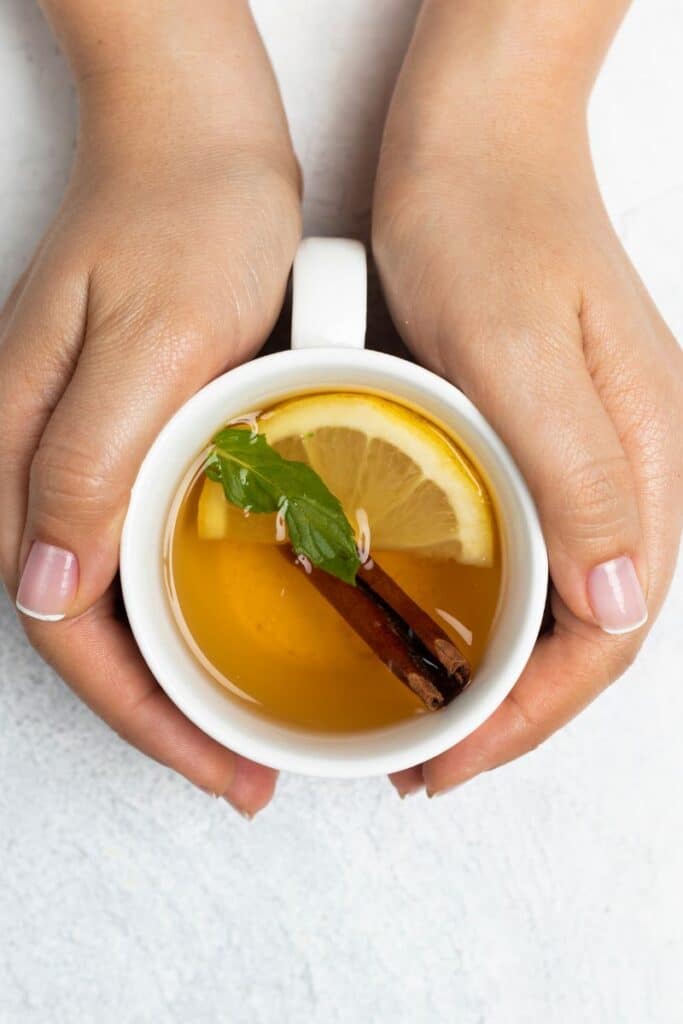
Rhodiola and St. John's Wort Tea: Mood-Boosting Elixir
- Who it benefits: Beneficial for individuals dealing with stress-related mood swings, occasional low energy, or seeking a natural mood enhancer. Suitable for those looking to uplift their spirits.
- Recipe: Mix equal parts Rhodiola and St. John's Wort
- Infusion: Steep for a mood-lifting cup
- Contraindications: Monitor blood pressure, and avoid if pregnant, nursing, or on antidepressant medications.
Lemon Balm and Valerian Tea: Citrusy Tranquility
- Who it benefits: Designed for individuals with mild to moderate anxiety seeking a blend that combines relaxation with a touch of citrus freshness. Suitable for daytime or evening consumption.
- Recipe: Blend 1 part lemon balm with 1 part valerian
- Infusion: Steep for a calming citrus-infused tea
- Contraindications: Exercise caution if taking sedative medications or during pregnancy.
Remember, while these teas can help support a sense of calm, they're just one tool in the toolbox. It's also important to consider other stress-reducing activities like exercise, meditation, and good sleep hygiene. So, put the kettle on, steep yourself a calming cup of herbal tea, and take a moment to just breathe.
Conclusion
In summary, herbal teas can be like friendly companions in the journey to manage stress and anxiety. From the calming chamomile to the adaptogenic ashwagandha, these teas offer natural ways to bring a sense of ease to our lives.
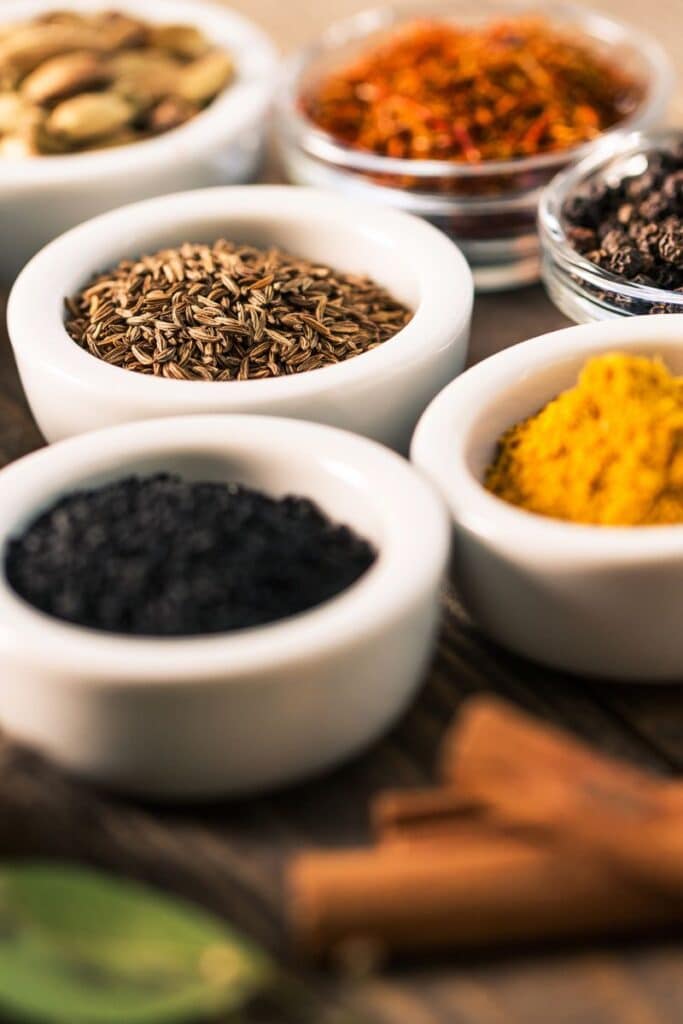
By understanding the benefits of each herb, we can create personalized blends that suit our tastes and needs. So, as you sip on these soothing infusions, remember that you're not just enjoying a warm beverage – you're embracing a gentle and natural way to take care of your well-being.
Here's to more moments of relaxation and balance in your daily routine!
Sources
Akhondzadeh, S., Naghavi, H. R., Vazirian, M., Shayeganpour, A., Rashidi, H., & Khani, M. (2001). Passionflower in the treatment of generalized anxiety: a pilot double-blind randomized controlled trial with oxazepam. Journal of Clinical Pharmacy and Therapeutics, 26(5), 363-367
Chandrasekhar, K., Kapoor, J., & Anishetty, S. (2012). A prospective, randomized double-blind, placebo-controlled study of safety and efficacy of a high-concentration full-spectrum extract of ashwagandha root in reducing stress and anxiety in adults. Indian Journal of Psychological Medicine, 34(3), 255.
Ishaque, S., Shamseer, L., Bukutu, C., & Vohra, S. (2012). Rhodiola rosea for physical and mental fatigue: a systematic review. BMC Complementary and Alternative Medicine, 12(1), 70.
Bent, S., Padula, A., Moore, D., Patterson, M., & Mehling, W. (2006). Valerian for sleep: a systematic review and meta-analysis. American Journal of Medicine, 119(12), 1005-1012.
Sarris, J., Stough, C., Teschke, R., Wahid, Z. T., & Bousman, C. A. (2013). Kava for the treatment of generalized anxiety disorder RCT: analysis of adverse reactions, liver function, addiction, and sexual effects. Phytotherapy Research, 27(11), 1723-1728.
Koulivand, P. H., Khaleghi Ghadiri, M., & Gorji, A. (2013). Lavender and the nervous system. Evidence-Based Complementary and Alternative Medicine, 2013.
